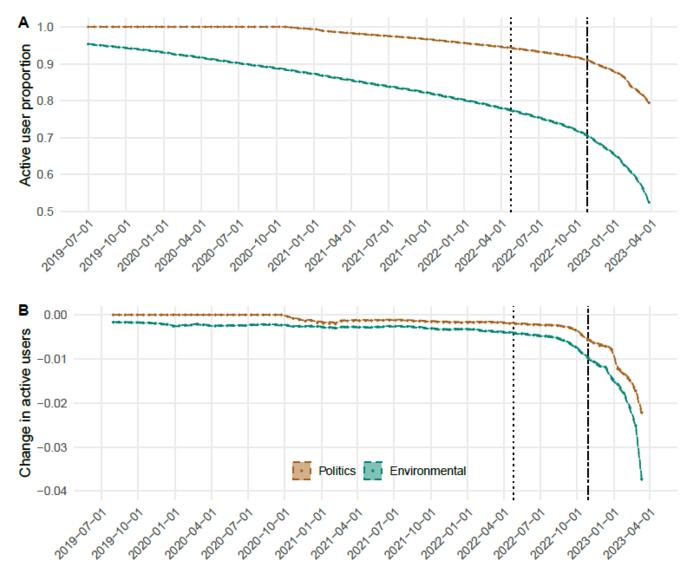In October 2022, Elon Musk purchased Twitter (recently renamed X), which had previously served as the leading social media platform for environmental discourse. Since then, reports a team of researchers in the journal Trends in Ecology and Evolution on August 15, there has been a mass exodus of environmental users on the platform—a phenomenon that could have serious implications for public communication surrounding topics like biodiversity, climate change, and natural disaster recovery.

Credit: Trends in Ecology & Evolution, Chang et al.
In October 2022, Elon Musk purchased Twitter (recently renamed X), which had previously served as the leading social media platform for environmental discourse. Since then, reports a team of researchers in the journal Trends in Ecology and Evolution on August 15, there has been a mass exodus of environmental users on the platform—a phenomenon that could have serious implications for public communication surrounding topics like biodiversity, climate change, and natural disaster recovery.
“Twitter has been the dominant social media platform for diverse environmental interests to communicate and organize around advocacy goals, exchange ideas and research, and new opportunities for collaboration,” writes the US-based research team of biologists and environmental consultants.
The team studied a group of 380,000 “environmentally-oriented users,” which included a wide range of people from the conservation community who had actively participated in pro-environmental discussions surrounding topics like climate change and biodiversity on Twitter. Users were considered “active” if they posted on the platform at least once within a 15-day period. The researchers found that in the 6-month period after Musk took over Twitter, only 52.5% of these environmental users were still actively using Twitter—a substantially larger drop-off rate than other “comparable online communities,” including users who discuss general politics on the platform.
“There is currently no platform equivalent to Twitter,” the team writes. “Thus, any changes in engagement by environmentally-minded users raises serious questions about where to track discourse about environmental conservation and how to mobilize pro-environmental segments of the public.”
Going forward, the authors call upon researchers to take an active role in the transition towards different modes of environmental communication—whether that be advocating for change within Twitter to help make it a useful platform for environmentalists again or collectively switching to another platform like Mastodon or Threads. They also point to resources like the Coalition for Independent Technology Research, which bring people together to voice concerns to Twitter representatives and policymakers.
“The future of Twitter as a platform for outreach and research is uncertain,” write the authors. “We need to create collaborations across industry, the non-profit sector, and academia to track public engagement with the environment across social media platforms for the benefit of primary research, applied environmental conservation, and climate mitigation.”
###
Trends in Ecology & Evolution, Chang et al. “Environmental users abandoned Twitter after Musk takeover.” https://www.cell.com/trends/ecology-evolution/fulltext/S0169-5347(23)00189-1
Trends in Ecology & Evolution (@Trends_Ecol_Evo), published by Cell Press, is a monthly review journal that contains polished, concise, and readable reviews and opinion pieces in all areas of ecology and evolutionary science. It aims to keep scientists informed of new developments and ideas across the full range of ecology and evolutionary biology—from the pure to the applied, and from molecular to global. Visit http://www.cell.com/trends/ecology-evolution. To receive Cell Press media alerts, please contact [email protected].
Journal
Trends in Ecology & Evolution
DOI
10.1016/j.tree.2023.07.002
Method of Research
Data/statistical analysis
Subject of Research
People
Article Title
Environmental users abandoned Twitter after Musk takeover
Article Publication Date
15-Aug-2023




